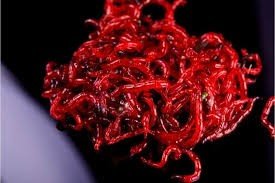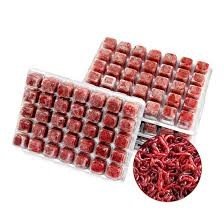The bright color of your Betta fish is always a good indication that he is in good healthy which is the result of a nutritional and diverse diet. A betta that enjoys a healthy diet is able to ward off infection more easily and less likely to be ill. A common question is ‘how often should you feed a betta fish bloodworms?’
Betta fish are carnivores and in the wild, a large part of their daily diet comprises of aquatic worms and a variety of insects that have fallen into the water.
Betta fish being kept in a tank should always have a diet that is high in protein. Popular protein foods include live or frozen worms including black, white and bloodworms, Daphnia (fruit flies) and mosquito larvae.
How often should you feed a betta fish bloodworms?

Understanding the Nutritional Value of Bloodworms
There are usually two different fish foods that are sold as bloodworms in pet shops. The first is called Chironomidae. These are not actually worms, but the bright red larvae of midge flies.
The other type of bloodworm comes from the genus Glycera and are about one centimeter in length and much thicker in girth than a black worm Both types are safe to feed your betta.
Chironomidae are much easier to breed and buy. Both types of bloodworm are available frozen, freeze dried or live and each type has its benefits.
Bloodworms contain 6 – 8% protein and are rich in iron but they don’t contain a wide range of amino acids. Whether you buy them fresh or frozen can impact their nutritional value.
● Live bloodworms

Live bloodworms are bloodworms in their most natural form.
Live bloodworms are more expensive, but there are benefits including the fact they are more nutritional because they are totally natural.
Bettas love fresh bloodworms because they have to hunt them, and this is a great way to keep your betta entertained.
Fresh bloodworms can only be bought in small quantities though as they need to be stored in the fridge for a maximum 2-3 days before they turn into midge flies.
Because the bloodworms are live there is a risk that they contain bacteria or parasites which could affect your betta.
● Freeze-dried bloodworms
Freeze-dried bloodworms are more convenient to use but do not have much nutritional value. They are usually sold in two different grades – Grade A and Grade B – with Grade A being the superior type to buy although much of their nutritional value is lost in the freeze-drying process.
A benefit is that any bacteria or parasites they contain will also be killed by freeze-drying. Freeze-dried bloodworms can be easily stored and before they are used, just need to be rehydrated by popping them into water.
- HEALTHY TREATS – Amzey Blood Worms are super rich in protein, minerals, and multi-vitamins, providing essential nutrients for all tropical fishes, turtles and more!
- PREMIUM QUALITY – Freeze dried blood worms are excellent food that stimulates good growth of your aquarium fishes and enhances their skin colors.
- 100% NATURAL – No additives or preservatives. These all natural blood worms taste great and fit nicely with their nutritional diet.
- ALTERNATIVE PET TREAT – Freeze dried blood worms are just as nutritious as live food but much convenient to store at home.
- FEEDING INSTRUCTIONS - Feed 2 to 3 times a week in addition to fish food only with much as your fish can consume within 3-5 minutes. Tasty treat for Neon Fish, Guppies Fish, Angel Fish, Betta Fish, Discus, Catfish, Cichlids, Goldfish, Anthias, turtle and mo
Prices pulled from the Amazon Product Advertising API on:
Product prices and availability are accurate as of the date/time indicated and are subject to change. Any price and availability information displayed on [relevant Amazon Site(s), as applicable] at the time of purchase will apply to the purchase of this product.
● Frozen bloodworms
Frozen bloodworms can be successfully stored for up to six months and also contain a good percentage of the nutrients. The freezing process kills any bacteria or parasites the bloodworm contain… which is good!
There are a couple of watch-points when feeding your betta frozen bloodworms. The whole cube will be too much to feed your betta so once the cube has been defrosted, it should be cut into smaller pieces – do not let any of the defrosted water get into your fish tank to avoid contamination.
When you feed your betta with a piece of defrosted bloodworm, if he has not eaten it within two minutes remove the food from the tank.
Prices pulled from the Amazon Product Advertising API on:
Product prices and availability are accurate as of the date/time indicated and are subject to change. Any price and availability information displayed on [relevant Amazon Site(s), as applicable] at the time of purchase will apply to the purchase of this product.
Factors Influencing Feeding Frequency
Bloodworms should not be the only food you give your betta because they do not contain a high level of protein and nor do they contain a range of amino acids. Bloodworms are ideal to feed your betta two or three times a week.
It is important to only feed your betta a small amount of bloodworm. Bettas only have a small stomach and over feeding them will cause stress.
One bloodworm for a single meal, every 2-3 days is adequate for an adult Betta – and proportionately less for younger fish. Don not feed your betta a defrosted frozen bloodworm as this is too much food.
The bloodworm that is not eaten will drop to the bottom of the tank where it will soon disintegrate and generate ammonia.
There is a line of thought amongst some breeders that it is good to feed live bloodworms more frequently to Bettas you would like to breed. It is said that because this will feel like an abundance of food to them, it will suggest to them that it is the breeding season.
Signs of Overfeeding or Underfeeding
 It is important not to feed your Betta too many bloodworms as this can cause serious health problems.
It is important not to feed your Betta too many bloodworms as this can cause serious health problems.
Swim bladder disease and constipation are both common and serious disorders in bettas that can be caused by overfeeding.
It is also important not to overfeed your betta bloodworms as this will cause an increase in ammonia in the fish tank.
Your betta will not be able to consume all the bloodworm which will quickly deteriorate on the floor of the tank causing a rise in the level of ammonia in the water. Beta can die from ammonia poisoning very quickly.
A betta with good body condition should be cone- shaped with the broadest part being the head and then a gradual tapering from the head to tail.
If your betta’s stomach is wider than his head, he is being overfed and if your betta is significantly thinner behind his head and not cone-shaped, he is underfed.
Best Practices and Tips for Bloodworm Feeding
 It is a good idea to incorporate bloodworms into a balanced diet for your betta, but it must be done carefully, and the bloodworms should be alternated with other foods that are better nutritionally for your Betta.
It is a good idea to incorporate bloodworms into a balanced diet for your betta, but it must be done carefully, and the bloodworms should be alternated with other foods that are better nutritionally for your Betta.
It is important to remember that when giving live bloodworms to your betta there is a chance of infection because they may contain bacteria.
You should buy your bloodworms from a reputable pet shop. Always rinse the bloodworms thoroughly before feeding them to your Betta and never let any of the water from the bloodworm/pet shop get into your fish tank.
It is a good idea to alternate the foods you give your Betta so that you give him a wide range of nutrients. Bettas need to be fed a small amount twice a day.
Some food like brine shrimps and mysis shrimps have a higher nutritional value- more so than bloodworms.
Daphnia are another good fresh food to feed Betta – pop them in a freezer for a short while to slow them down before you give them to your betta. Mosquito larvae and vinegar eels are also good. It is important to only feed your fish bloodworms a couple of times each week as they are very rich.
Final thoughts – How often should you feed a betta fish bloodworms?
 Bloodworms can be a great food to give your Betta, but best to stick to the couple of times a week rule and certainly do not make bloodworms the staple food in your Betta’s diet.
Bloodworms can be a great food to give your Betta, but best to stick to the couple of times a week rule and certainly do not make bloodworms the staple food in your Betta’s diet.
It is of paramount importance to give your betta a healthy and varied diet to ensure that he stays in good health and his magnificent color could be no richer.
Feeding your betta with too many bloodworms can result in constipation, swim bladder disease and other diseases.
If you are feeding your betta too much bloodworm for a meal, much will not be eaten, and you will have to remove it from the tank and ditch it – which will dent your wallet too!
..







![Alternanthera Reineckii Mini Beginner’s Guide [UPDATED 2023] Alternanthera reineckii 'mini'](https://aquariumhunter.com/wp-content/uploads/2021/11/Alternanthera-Reineckii-Mini.jpg)

![[2023] How Long Can a Turtle Go Without Eating? How Long Can a Turtle Go Without Eating](https://aquariumhunter.com/wp-content/uploads/2022/01/How-Long-Can-Turtles-Go-Without-Eating-e1568197018684.jpg)